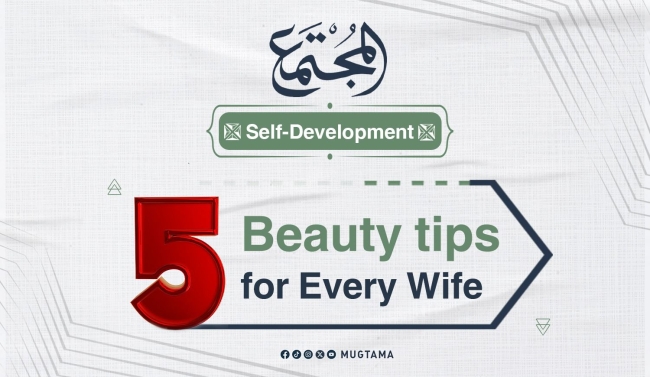The materialistic lifestyle, consumerism, and fashion trends may drive Muslim women to imitate every odd thing in the world of cosmetics and beauty without a religious guideline or commitment to the Quran and the Sunnah.
The next lines highlight 5 things that provide every Muslim woman with tips that meet her needs as a female, preserve her modesty, ensure marital happiness with her husband, and enhance her beauty.
Firstly, a woman should only display her beauty for her husband, not in front of strangers and non-mahrams (family members), as happens in some societies. Allah the Almighty says, “And stay in your houses, and do not display yourselves like that of the times of ignorance, and perform As-Salat (Iqamatas-Salat), and give Zakat and obey Allah and His Messenger.” (Al-Ahzab: 33)
Ibn Baz says, “It is obligatory upon women to fear Allah and to be cautious of what Allah has prohibited, such as displaying adornments to non-mahrams, which Allah has prohibited. Because it is purer for the hearts, safer for the society from temptations, and prevents from indecency.”
Secondly, women must adorn for their husbands. Aisha (may Allah be pleased with her) narrated: “The Apostle of Allah (ﷺ) entered upon me and saw two silver rings in my hand. He asked, 'What is this, Aishah? ' I said, 'I have made two ornaments myself for you, Messenger of Allah (ﷺ). '” (Sunan Abi Dawud).
Asma bint Yazid said: “Certainly, I beautified Aisha for the Messenger of Allah (ﷺ). I then came to him and called him to see her. He approached and sat at her side. A large mug of milk was brought to him which he drank from and passed the same to her. She lowered her head and displayed modesty.” (Narrated by Ahmad)
The meaning of “beautified” here is that she adorned her for him to look at her. It was the custom among the Arabs to prepare the bride before her husband enters upon her so that she appears in her best adornment, to make her desirable to him.
Thirdly, acting upon the famous advice of one of the eloquent Arab women, Umamah Bint Al-Harith to her daughter, before her marriage: “My dear daughter, take from me ten qualities, and they will be for you an asset and a reminder:
Accompany him in contentment and be amicable with him by hearing and obeying. Safeguard where his eyes land and safeguard what his nose smells, so that his eyes never see anything ugly from you and his nose never smells any repugnant odor. Kohl is the best make-up, and water (i.e., good hygiene) is the best perfume.”
This advice aligns with what Abdullah bin Ja'far advised his daughter, saying, “Adorn yourself with kohl, for it is the best adornment, and the finest scent is that of water.” Similarly, Abu Al-Aswad advised his daughter, “Adorn yourself, and the best adornment is kohl, and you should use perfume, and the best of perfumes is that of Wudu’.”
Fourthly, preserve cleanliness and adornment. Abu Al-Faraj ibn Al-Jawzi, in his book “Ahkam An-Nisaa,” says: “A woman, upon safeguarding her morals and refining her beauty, earns favor with her husband by preserving her adornment and cleanliness. She should adorn herself with various types of jewelry, different garments, and methods of beautification that are pleasing to the man. She should be extremely cautious that nothing displeasing, such as dirt, unpleasant odors, or unacceptable changes, catches the man's eye.”
Fifthly, be cautious of routine and seek renewal, adorning herself with what is beneficial and useful. Sheikh Ibn Baz said: “It is legislated for a woman to adorn herself for her husband with what Allah has legislated and permitted. She should adorn herself with good clothing in his presence and maintain cleanliness with soap and the like. Soap is something that beautifies and cleanses her and removes dirt from her. If there are permissible cosmetics in which there is nothing forbidden, impure, harmful to the face, or causing severe consequences, then there is no harm. We take from the West and the East what benefits us and leave what harms us. If something comes from the West or the East that benefits us, we take it and benefit from it, just as we take from them weapons, airplanes, cars, ships, and so on. We take from them medicines and non-medicines, and from the aspects of adornment that benefit us, without imitating those enemies of Allah. Rather, we take what is beneficial and leave what is harmful. Adornment is required of women for their husbands—not in mingling with stranger men, but for her home and her husband. And Allah is the One sought for help.”
-------------------------------------------------------------
(1) Majmu' al-Fatwa of Sheikh ibn Baz (21/ 222).


